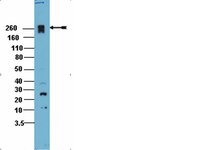Collagen signaling enhances tumor progression after anti-VEGF therapy in a murine model of pancreatic ductal adenocarcinoma.
Aguilera, KY; Rivera, LB; Hur, H; Carbon, JG; Toombs, JE; Goldstein, CD; Dellinger, MT; Castrillon, DH; Brekken, RA
Cancer research
74
1032-44
2014
Abstract anzeigen
There is growing evidence that antiangiogenic therapy stimulates cancer cell invasion and metastasis. However, the underlying molecular mechanisms responsible for these changes have not been fully defined. Here, we report that anti-VEGF therapy promotes local invasion and metastasis by inducing collagen signaling in cancer cells. We show that chronic VEGF inhibition in a genetically engineered mouse model of pancreatic ductal adenocarcinoma (PDA) induces hypoxia, a less differentiated mesenchymal-like tumor cell phenotype, TGF-β expression, and collagen deposition and signaling. In addition, we show that collagen signaling is critical for protumorigenic activity of TGF-β in vitro. To further model the impact of collagen signaling in tumors, we evaluated PDA in mice lacking Sparc, a protein that reduces collagen binding to cell surface receptors. Importantly, we show that loss of Sparc increases collagen signaling and tumor progression. Together, these findings suggest that collagen actively promotes PDA spread and that enhanced disease progression associated with anti-VEGF therapy can arise from elevated extracellular matrix-mediated signaling. | 24346431
 |








